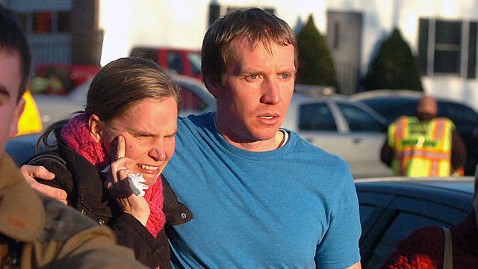
Hermione sans dildo.
(Credit:
BravoTV Screenshot by Chris Matyszczyk/CNET)
Last week, we left our protagonists on "Start-Ups: Silicon Valley" hanging on the end of a strap-on.
No, wait. It was Hermione (blonde, British, boozer) who was hanging on to a strap-on at the end.
Her brother Ben (short, pretty, pretty short) was livid with her, even though it was her birthday party. One doesn't play with sex toys in front of VCs.
Not unless those sex toys are social and can entice 100 million users within a week.
Ben reveals to Hermione something more important than whether they lost $500,000 to her dildo dancing: he isn't going to pursue a relationship with Sarah (blonde, big-headed lifecaster).
Well, he has Ashley, you see. She's a model entrepreneur. Actually, that's not quite right. She's a model/entrepreneur. They have been seeing each other for four years. When they're together, they're on. When they're not together, they're entirely off.
"It's perfect,' explains Ben, off-handedly.
A cute girl in an ugly world
Meanwhile, another perfect pair -- Kimmy (dark, deeply ambitious, dullish) is hanging out with Dwight (light, tight, hairy).
Dwight and Kimmy besmirch Sarah as being a sad, dumb freeloader. Her greatest advantage, they opine, is that she's a cute girl in a place where most people are ugly.
Oddly, Dwight and Kimmy are cute too. Kimmy, though, is very serious about her fashion site, Shunova.
What kind of fashion site is it? Shunoidea.
Ben and Hernione are off to try another investment pitch. This time, they encounter former astronaut Esther Dyson. Hermione immediately sucks up to Dyson that she's wearing space pants in her honor.
Dyson looks like she would love to suck Hermione up in a Dyson vacuum cleaner.
Ben enthuses about Ignite, their app that is all about being able to predict your lifespan. And, um, motivating yourself to die later than you might.
Ignite also includes a pad that you step on and, oh, measure things. This is colloquially known as the
iPad. Dyson asks to see it.
There's a slight problem. It doesn't exist yet. Dyson looks like she'd happily suck Ben up into a Dyson too.
A booty call ignited
But what of David (gay, sane)? His start-up is called Goal Sponsors. It's sort of similar to, um, Ignite. Without the iPad and the actual calculation of when you're going to die. But with sponsors.
Yes, it's AA for the health-neurotics.
"We just have a lot of chemistry and not a lot of time to sleep."
Is this David talking about his start-up? No, it's Ben talking about his model relationship with Ashley. He describes it in British as "snuggles." He translates this as "booty call."
Ben is worried that with Ashley in town he will not be able to use his head. Really.
The potential investors from Gramercy Ventures -- together with Dyson -- go to see prototypes of the Ignite Pad. It's a bathroom scale. But because you can give it more meaning through your smart iPhone, it's a very smart bathroom scale.
Potential investor Michael Gale -- he who may (or may not) have been offended by Hermione's strap-on performance -- asks whether "Ignite" is too male a brand name. Hermione goes into an imaginative explanation involving sperm.
Ben suddenly looks as if he is about to give birth.
"When Ben and I first kissed, she came two days after."
A slightly odd chain of events, you might imagine. Actually, this is Sarah's tale of woe concerning Ashley's sudden arrival at the last SXSW. Sarah has heard Ashley is in town now. David explains to her that they're both gorgeous.
Yes, of course they're at a party. Sarah is upset. David tells her he understands. Sarah believes Ben is trying to have his cake and eat it.
There's quite a lot of cake on Sarah's face. But, as yet, no egg.
Ignite has ignition
Meanwhile, Gale explains to Ben and Hermione that he doesn't like egg on his face either. He hates looking stupid. But Dyson actually likes the Ignite idea, so, together, they're going to give them $500,000.
Yes, the strap-on didn't make the investors stroll off. There was a clue when the meeting started. Gale brought some red champagne. Yes, blood red.
Hermione celebrates with her human strap-on. He's called Jay. She worries he's gay. Because he's keeping her at bay.
But then she decides that's a good thing. She must, after all, concentrate on her start-up.
Sarah booted
But first, another party.
"It's going to take a certain kind of guy to ever be able to deal with me," offers Hermione to Ashley. Yes, indeed. An insane guy, might be one thought.
Oddly enough, Hermione then chooses the next moment -- entirely by coincidence -- to tell Ashley that Sarah had been on a date with Ben. Yes, a date that included kissing.
More Technically Incorrect
"I didn't know that you guys were together," Sarah tells Ashley. With typical sensitivity, she goes on to insist that Ben had told her there was nothing between him and Ashley.
Oh, other than that he had mentioned that Ashley was stalking him.
Ashley gets shirty with Sarah. She demands that she lay off Ben. Sarah confronts Ben. She asks him to admit that he called Ashley a stalker.
Ben denies it and then utters a line that must have been fed to him: "You want to create drama wherever you are."
Yes, Ben, they do, those wily producers.
Meanwhile, Sarah is left to sniffle and philosophize.
"When girls are taken advantage of by a guy, we should stand together," she says.
It's as if she's never watched any of the "Real Housewives" franchise.























